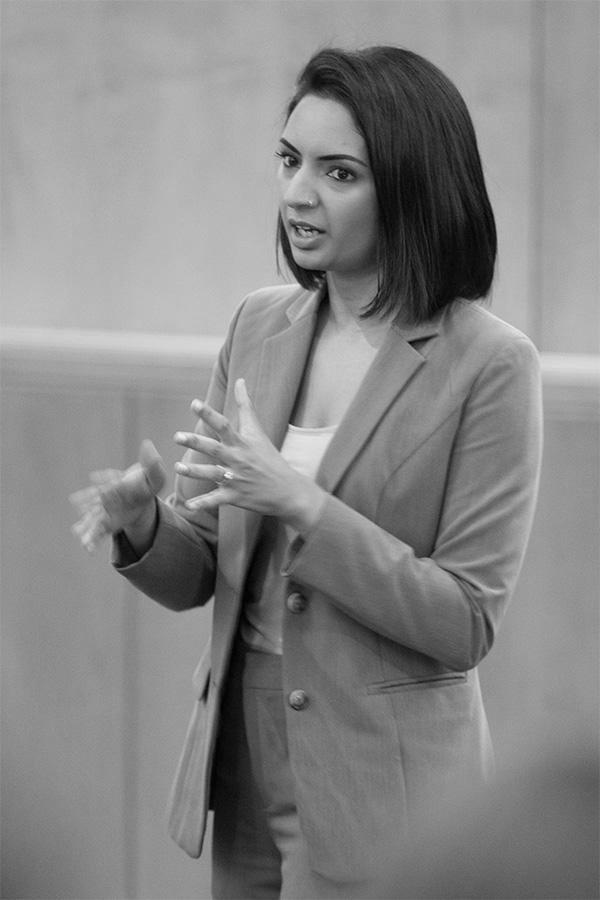A few years ago, Tuck assistant professor Sonya Mishra was talking with her research colleagues, Charlotte Townsend and Laura Kray, about the Forbes rankings of the “Most Powerful People” and the “Most Powerful Women.” They noticed something intriguing.
 An assistant professor of business administration at Tuck, Sonya Mishra teaches Leading Diverse Organizations in the MBA program.
An assistant professor of business administration at Tuck, Sonya Mishra teaches Leading Diverse Organizations in the MBA program.
The individuals on the “Most Powerful People” list consisted mostly of men, and these men were almost exclusively world leaders (such as Vladimir Putin) and CEOs (such as Jamie Dimon). The “Most Powerful Women” list, however, had a strong representation of women in the entertainment industry, such as Beyoncé, Oprah Winfrey, and Taylor Swift.
This got them thinking. The word “powerful” was in the title of each ranking, but the rankings were categorizing different kinds of power. While Oprah is certainly powerful, is she powerful like Xi Jinping, the president of China? Not really. Oprah is rich and famous and has millions of fans. Xi Jinping controls a country of 1.4 billion people. Under the traditional definition of power—possessing control of valuable resources—Xi Jinping certainly fits. Mishra and her colleagues reasoned that Oprah has something different: status, which is defined in the academic literature as being respected in the eyes of others.
Having identified this discrepancy in the “most powerful” lists between men, who had true power, and women, who had something more like status, Mishra, Townsend, and Kray designed a study to further investigate the connection between gender and social hierarchy. Their paper was recently published in Psychological Science and is titled “Not All Powerful People Are Created Equal: An Examination of Gender and Pathways to Social Hierarchy Through the Lens of Social Cognition.”
In the interview below, which has been condensed and edited for clarity, Mishra explains the research, her findings, and the takeaways for firms trying to create more equitable workplaces.
How did you probe the stereotypes underlying conceptions of power and status?
In our first study, we gathered photos of the people on the “Most Powerful People” and “Most Powerful Women” lists, we showed them to hundreds of study participants, and we asked if they recognized them. Once we got their answer, we told them who the people on the list were. Then we asked the participants to rate how much power or status each person had. They would rate the person’s power by answering a question like “Indicate the extent to which this person controls valuable resources on a 1 to 7 scale,” or “Indicate the extent to which this person is highly respected in society.” The second question pertains more to status. What we found was that amongst these powerful people, women had higher perceived status than men, but men had higher perceived power than women. Additionally, men who had power were much more likely to be recognized that men who had status. For women, status was what was predicting their recognition, not power.
What about the women on the “Most Powerful People” list, such as Mary Barra, the CEO of General Motors, or Angela Merkel, the former chancellor of Germany?
Yes, those were some of the women who controlled resources, having power in the traditional sense. They were just less likely to be household names compared to the women who had higher status.
How else does this stereotype manifest in society?
That’s what we wanted to know in our second study. In that study, we collected three different measures for all the targets in the Powerful People and Powerful Women lists: Their media mentions, and the number of followers they had on X (formerly Twitter) and on Instagram. We found that for women, the more status they had, the more followers they had, and the more they were being talked about in the media. For men, it was the more power they had, the more they were being discussed in the media, and the more they were being followed. So, we were capturing how society was gravitating towards these men in power and these women in status. That might mean we, as perceivers, have this preference where we like women in status and men in power better, rather than the other way around.
Why do you think we tend to connect women with status and men with power?
I studied that question in a paper that came out in 2022. I found that status is perceived as more feminine than power, because there’s this stereotype that women are other-oriented. And to attain and maintain status, you have to pay attention to the people around you and make sure you’re doing things that are worthy of their respect. Power is different. You get power handed down from some entity, and once you have it, you don’t have to rely on others anymore. So, because status is more other-oriented, maybe when people see women in positions of status, it confirms stereotypes. Since we, as perceivers, pay more attention to information that aligns with stereotypes, then we are more attentive to women with status and men with power.
Are women internalizing this stereotype?
This is something we get at in the third study in our new paper. We asked men and women how they saw themselves in terms of power and status, through an implicit association test. We found that women were associating themselves with status more so than with power, whereas men weren’t differentiating between the two. It seems like women may be identifying with status because perhaps on some level, women know it’s a safer bet for them. In my 2022 paper, I find that when women appear to seek power, they’re more likely to get backlash, and more likely to be seen as unlikeable compared to when they seek status.
If Forbes is saying these certain women are the most powerful women in the world, but they’re really just high-status, we’re not acknowledging women who have power in the traditional sense. When we pay more attention to high-status women as opposed to high-power women, we’re essentially boxing women into a form of influence that is much more diffuse and mutable, as status is taken away more easily than is power.
So, it sounds like this connection we have between women and status could be limiting what kind of power women strive for.
Yes, absolutely. Power is very material and more tangible than status. If Forbes is saying these certain women are the most powerful women in the world, but they’re really just high-status, we’re not acknowledging women who have power in the traditional sense. When we pay more attention to high-status women as opposed to high-power women, we’re essentially boxing women into a form of influence that is much more diffuse and mutable, as status is taken away more easily than is power.
Given your findings, what advice do you have for firms who want to hire more women into powerful positions?
So, a lot of leadership positions are characterized by both high power and high status. But if organizations play up the “respect” aspect more, they may be able to attract more women who want leadership roles, but don’t want to face the backlash associated with appearing “power-seeking.” In a follow-up paper, I’m also finding that men are more likely to support diversity initiatives aimed at increased the proportion of women in leadership when they are framed as “increasing women’s access to highly respected positions.”
How do you think we can combat these stereotypes, rather than just work around them?
This is something I grapple with all the time. These stereotypes are deeply ingrained in society. But research has shown that the more you are exposed to people who run counter to stereotypes, the less engrained your stereotype becomes. Forbes might be doing a disservice to society by claiming these high-status women are powerful. They should really be highlighting the high-power women: the women who are CEOs and world leaders. The more we become conditioned to seeing women in positions of power, the stronger our association between women and power becomes. Perhaps that’s the long-term plan, and in the short term, we can frame the language a little differently. In fact, why not do both at once?
More from Sonya Mishra
[embedded content]
Tuck School of Business
Please visit the firm link to site




